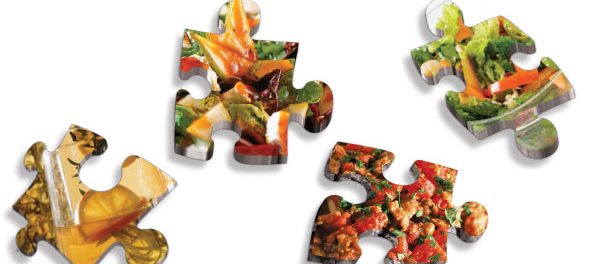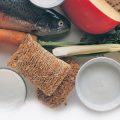Making The Pieces Fit
By Janis Roszler, RD, CDE, LD/N
When you open a new puzzle box from the store, you see a mix of colored pieces that don’t appear to fit together. But, with time and patience, you can arrange those pieces into a lovely picture. Like a puzzle, our bodies need a mix of foods that don’t always seem to fit together: calories, carbohydrates, protein and fat. Let’s examine the four puzzle pieces our bodies need each day.
CALORIES
Calorie is the term we use to describe the energy that food provides to our bodies. Calories come from the three main nutrients in food: carbohydrates, protein and fat. Foods that contain a lot of calories offer more energy to our bodies. Those with fewer calories, offer less. Like a car that does a great deal of traveling and requires more gas, people who are very active need to eat a larger amount of calories. Those who are less active need fewer calories. If you eat more calories than you need, your body will store them as fat that you can use for energy later. But if you eat too many calories too often, you will gain weight. If you are overweight and would like to lose weight, increase your activity level while eating fewer calories. A healthy weight loss goal is a loss of 1–2 pounds per week. Many people achieve this by moving more and eating 500 fewer calories each day.
CARBOHYDRATES
Carbohydrates provide the type of fast-acting energy that our bodies prefer to use. Each gram of carbohydrate provides 4 calories. Foods that contain carbohydrates include bread, pasta, rice, starchy vegetables (like corn, peas and potatoes) milk, yogurt and fruit or fruit juices. The catch is that carbohydrate foods can raise blood glucose levels, so it is important to keep your intake of carbohydrate foods within a healthy amount.
One way to see if you are eating the right amount of carbohydrate is to check your blood glucose level after a meal. To do this, check your watch when you take the first bite of your meal. Then, check your blood 2 hours after that first bite. If your reading is within a healthy range, your carbohydrate portion was fine. For most people, a healthy post-meal blood glucose level is less than 180 mg/dL. Ask your health care team what post-meal glucose goal is right for you.
PROTEINS
Protein is made up of amino acids that are used by the body to build and repair tissue. Protein is also needed to make hormones and enzymes, and keeps the immune system working properly to help fight off infections and disease. There are many different types of foods that provide protein to the body. Animal sources of protein include meat, poultry, seafood, eggs, cheese, milk and yogurt. You can also get protein from plant foods, such as dried beans and peas, soy products (such as tofu and soy milk) and peanut butter. Like carbohydrates, a gram of protein also provides 4 calories.
FATS
Fats play a vital role in the health of our bodies. We don’t need to consume a lot of fat each day but some is needed to keep our skin healthy, make certain hormones, carry fat-soluble vitamins A, D, E and K and help build cell membranes. Fat-based foods, such as oils, margarines, butter and nuts, also provide the body with calories. A gram of fat has 9 calories, which is a little more than double the amount of calories found in carbohydrates and protein. That’s why foods high in fat are so “fattening.”
LET’S PUT OUR DIET PUZZLE TOGETHER
It is important to eat a variety of foods each day. Each food group offers different vitamins and minerals your body needs to help it function well. No single group should be avoided. There are many weight loss diets that urge people to cut one of these food groups. Some weight loss plans advise you to avoid almost all carbohydrates while others tell people to stop eating all fats. These diets can be very harmful. Our bodies need the important nutrients that each type of food offers. A diet that cuts out one entire type of food is not going to help you stay healthy.
When you choose your foods for your meals and snacks, think of how you can include a variety of foods that contain carbohydrates, protein and fat. A dietitian can help you create a meal plan that meets your specific needs. There are also many dietitian and nutrition experts who have written books and articles that can help you decide how to plan your meals. Eating a variety of foods in the amounts that you need will help you feel well and fight off illness. The foods that you can choose from may seem confusing at first, but, with some careful planning, they can help you become a puzzle picture of good health.













